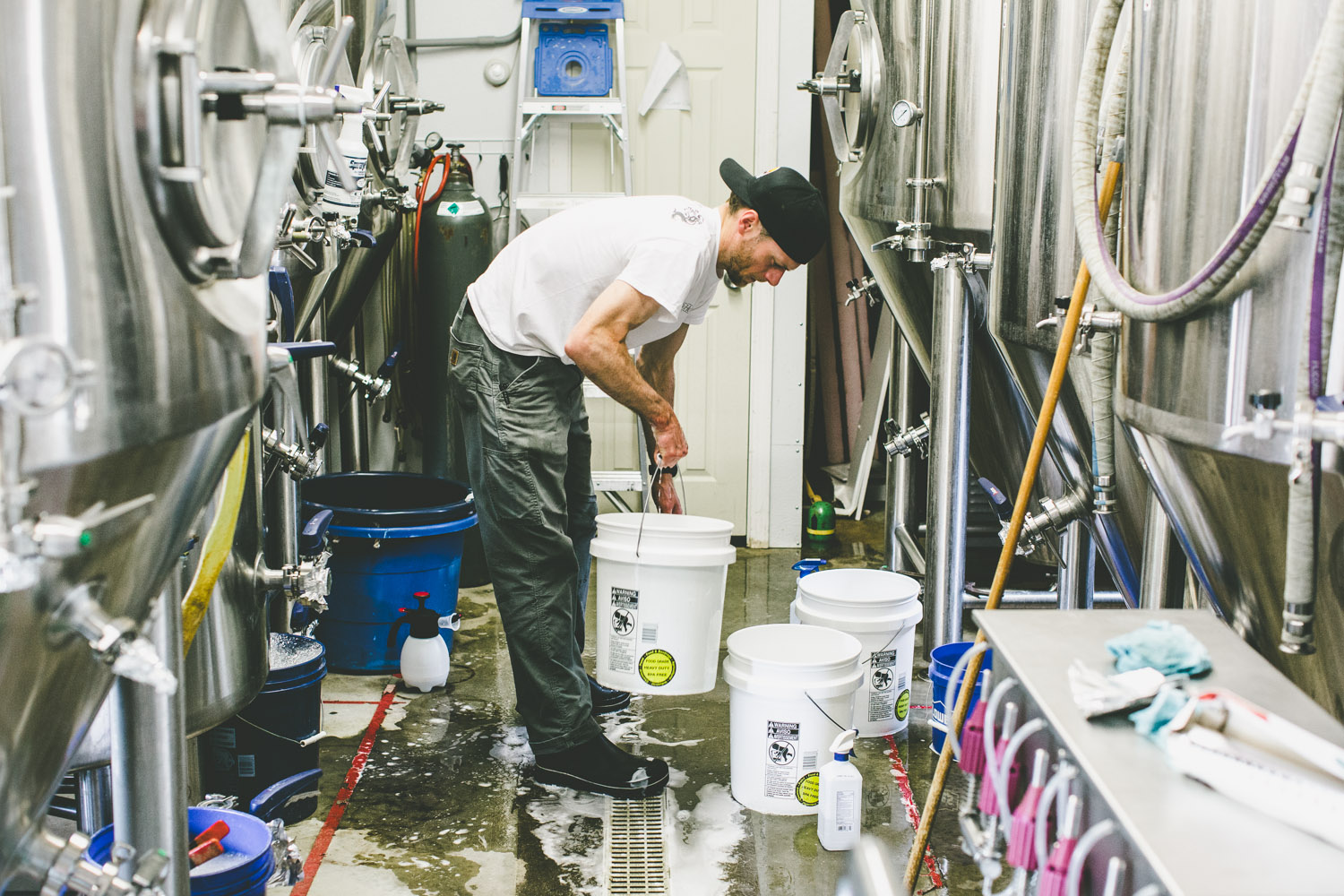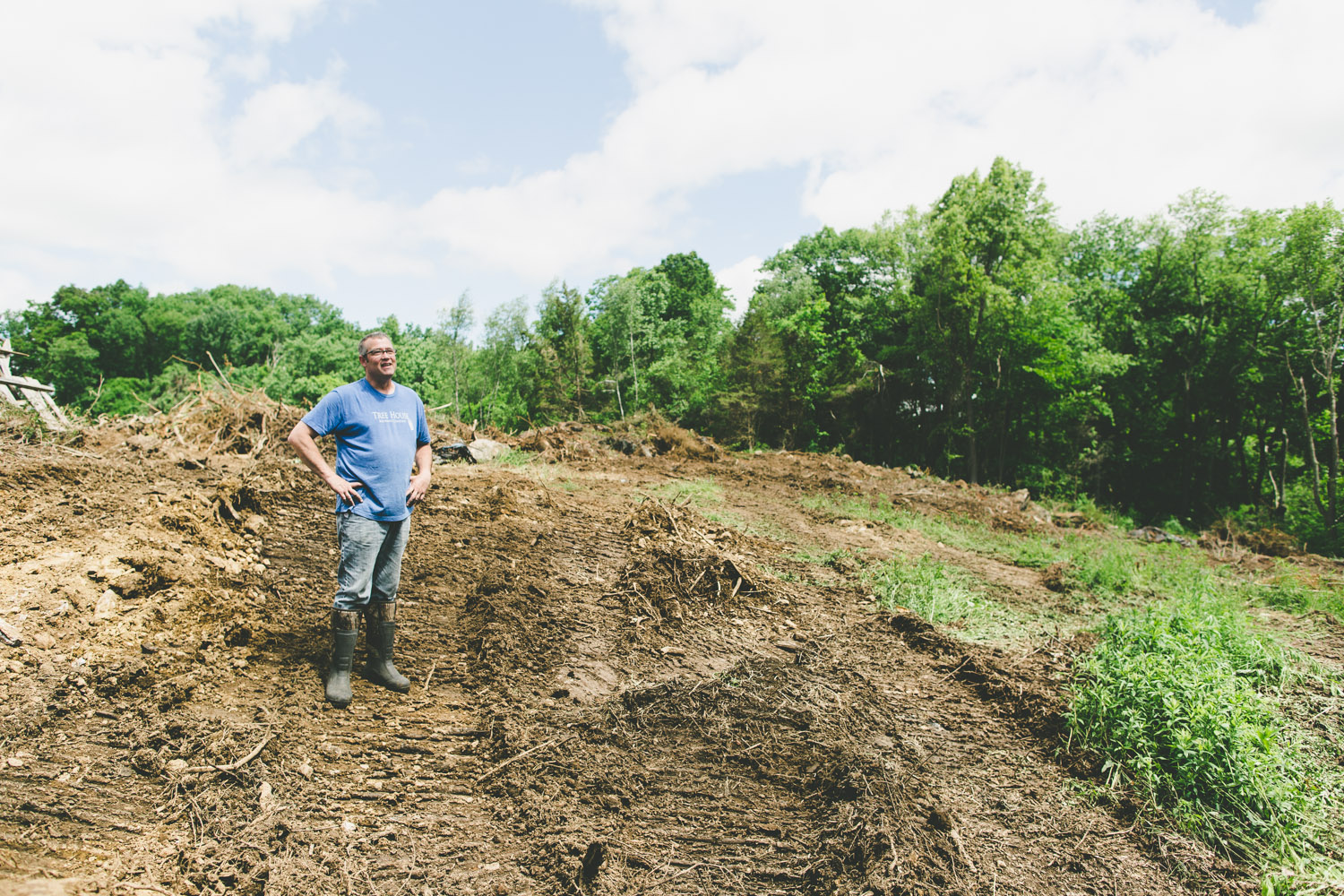Winding down back roads through western Massachusetts, through towns like Ware, Palmer, and Monson, I’m reminded of a passage by author C. S. Giscombe, in which he describes his ability to know when he was close to home simply by the rhythm of the road. After a decade in the flatlands of Chicago, I expected homesickness to give way to sea-sickness as I drove through the western half of the state on a pilgrimage to Tree House Brewing. But driving along I-90 and off onto route 20, the mystical power of a pitch and roll in the road cast its spell.
Idling up to the farm — a field of rye on one side and turned-up earth on the other, a bright red silo bursts into the air with the faded letters for “Old Oar Farm” on the top. A scattering of out-buildings and old trucks tucked under a tin roof rounded out the backside of the property. A dirt lot laid empty in front of a glorified shed along the road. This was the state of Tree House Brewing when I arrived, temporarily housed in a garage on a family farm overlooking Pioneer Valley — a caravan of silver-bottomed clouds sloping off into the distance.
A young, sturdy, and serious-looking man shook my hand as I ducked under the garage door. “Somewhere around here Dean is stacking grain bags, 'til then, make yourself at home.” And he hopped back onto the brewhouse, steaming with the scent of hot grain and steel.
Treehouse Brewing is Nate Lanier, Dean Rohan, and Damien Goudreau, three friends who took the long way through different jobs, careers, and shared hobbies before the stars aligned for the brewery. “We were playing music together,” explains Rohan, a former plumber and DJ, “and Nate made some beer for a party we were all going to. His beer was just so much better than anything else, even the commercial stuff that people brought. It kind of occurred to us that we should maybe do something about that.”
After a shoulder injury took Rohan out of the plumbing business for over a year, his interest in getting serious about a brewery grew. They started brewing in nearby Brimfield, making some remarkable beer but they struggled to gain the approval of the local government. “Out here, the state makes the laws, and locals interpret them” explains Lanier. “In Brimfield, there were 800 people for us, and one against. And in Western Massachusetts, local governments have a lot of power. So we had to look elsewhere."
Their challenges and opportunities seemed to coalesce. Goudreau married his girlfriend Kim, who’s family owned a sizable farm in nearby Monson, but lacked a legacy plan for sustaining the land. One of three daughters, Kim was the only one that stayed behind with an interest in the farm, and as the pressure mounted for the brewery project to get underway, her burden started looking like exactly what the team needed.
“We got approval for a sizable brewery project, even more than what we thought we needed in the short-term,” explains Rohan. "The planning committee encouraged us to think bigger. So we’re clearing the land on the backside, putting in the first big building for the brewery and a canning line, and making plans for some more storage and barrels next door. This brewery is going to ensure the sustainability of the farm overall.”
“If you’re in Boston and you look west of I-95, you think this is where milk comes from.
”
I leave Rohan behind loading grain into a shipping container and explore the back of the property, stepping over mashed roots and stumps, upturned earth, and crumbling stone walls. Along the backside of the land, a wall of trees edges onto a dense forest. One particular tree stands taller than the rest — it’s trunk more rugged than the others, almost fossilized. “Thats where we’ll build the actual tree house,” says Rohan, hands on his hips, standing on the high grade behind me.
Back in the brew house, alongside Lanier, Brenden Prindiville moves as silently and precisely as a sous chef. Quick, shallow breaths between lifting buckets, snapping clamps on an off, and keeping alert to any possible words from above. Lanier, on the other hand, finds his moments. He stands back and watches, thinks, and takes sweeping steps across Prindville’s carefully charted lines through the small garage. It’s like a dance in a single count, at two different speeds.
“It’s part of our one-to-three year holy-shit-we-need-more-beer plan.”
This is the last time Tree House will be this small. On a full ten acres, the small garage where the brewery is currently housed is only a moment in time. A good portion of the land is already cleared for a 10,000 square foot facility that will enable Tree House to have a permanent home. Watching Lanier crane his neck between the garage door and the lauter tun, I get the sense that he’s had to calm his eagerness on a daily basis. Peering out over the top of the tanks, he’s got a full view of the future lot. "We’ll immediately jump to 5,000 barrels across the street,” he explains. "It’s part of our one-to-three year holy-shit-we-need-more-beer plan.”
Rohan describes Lanier as “maniacal.” And you can see it in his eyes a bit, that laser focus on the process of beer-making. But this intensity is a different tone than Rohan is used to. “I had to adjust quite a bit. I’m 47 years old. It’s not easy having a young guy like that telling you what to do every day. I had to get into a different rhythm. It’s working.” Lanier is used to directing traffic on a job site. Coming from the construction industry, he directed teams of union contractors as a project manager. As a result, there’s very little shyness left in him, and at a start-up brewery, his confidence is uncommon for a young brewer.
When asked if he has any worries or anxieties about the next few years, Lanier’s lips tighten and his stare shifts from a thousand yards away to right where we stand. “My house is on the line,” he says. “So yeah.” He turns, and tips a couple of glasses down off a high shelf. “Let’s go ahead and try this saison I bottled yesterday.” A bottle refermented sour with grassy notes and some funk, only a touch carbonation after a day in the bottle, pours a hazy bright yellow and sparkles in the sun. Lanier cracked a rare smile. Dean even said so.
Like any small up-starts, Tree House has to strike a balance between meeting demand and exploring new territory in their beers. Julius is a clear favorite, with 3.5lbs of hops per barrel, a fluffy-soft mouthfeel, and a rare perfect 100/100 score on Rate Beer. At a time when most brewers lament trying to sell an IPA in a crowded market, Lanier shot to the very front of the line. But Lanier values his freedom as much as his laurels, using his early success to clear some creative space.
"From the very beginning, the success of Julius has allowed Brenden and I to have full autonomy to do whatever we want, refining the beer. We can’t even come close to keeping up with demand for Julius. So I guess at this point it doesn’t particularly matter what we brew because we’ll sell out of it and sell out of it fast. So, we still have he flexibility to brew what we want for the time-being. When we move across the street, it’s going to be a different animal. It’ll be close to the Alchemist model where we have a beer we brew as often as possible year-round, continuously refine it, make it as good as possible, and then from that, afford us the opportunity to have a program where we can do whatever we want."
The next day, the Tree House team was readying themselves for the release of Yahhhrrrggg!!!, a collaboration with Lawson’s finest liquids in Vermont. It’s a bit of a coup for the young brewery. "This sounds lofty, but it’s kind of a dream come true,” says Lanier. "I looked up to Sean [Lawson] and drank his beers for years before we opened the brewery. I lost a lot of sleep between the time we brewed it and the time we served it. We didn’t go to his house and just sort of watch and leave the responsibility on him. He came here to brew it and it was all on us. which was pretty nerve-wracking.”
Tree House has quickly found itself mentioned alongside other sought-after breweries in the country. Names like Hill Farmstead and Lawson’s Finest are incredible company to be in, and the gravity of that comparison is not lost on Lanier. “Breweries like Sante Adairius, Alpine, recently New Glarus — here in the Northeast, Alchemist, Lawson’s Finest, and Hill Farmstead are all places we’re inspired by and want to live up to. The Vermont thing is good because they give a shit — they care. We hope that through our hard work and our attention, that we’ll fall into that category.”
As I pack up my gear and turn the car west toward Springfield, a trailer pulls up with palates of glass bottles that Dean has to find a home for, and start preparing for the Lawson’s release. It’s odd to see such an industrial presence on this quiet farm so far from any real population. I imagine the lines forming tomorrow as the brewhouse sits quiet for the first time all week, and the team buzzes around the property trying to entertain and serve guests from all over the country. By the end of the day, they’ll be exhausted, thrilled, and the shelves of the tasting room will be lined with dozens of new trophies brought by their biggest fans from all over the world.
 Michael Kiser
Michael Kiser








































